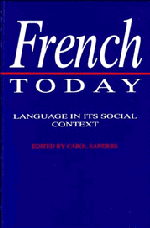Book contents
- Frontmatter
- Contents
- List of figures and maps
- List of tables
- Notes on the contributors
- Acknowledgements
- Introduction
- 1 French: a planned language?
- 2 Sociosituational variation
- 3 Regional variation in France
- 4 The other languages of France: towards a multilingual policy
- 5 The migrant languages of Paris
- 6 Gender and language in French
- 7 The reform of the writing system
- 8 Alternative French
- 9 New words for new technologies
- 10 Language and style in politics
- 11 French and French-based Creoles: the case of the French Caribbean
- 12 French in Africa
- 13 French in Canada
- 14 Sociolinguistic variation and the linguist
- Bibliography
- Index
1 - French: a planned language?
Published online by Cambridge University Press: 05 June 2012
- Frontmatter
- Contents
- List of figures and maps
- List of tables
- Notes on the contributors
- Acknowledgements
- Introduction
- 1 French: a planned language?
- 2 Sociosituational variation
- 3 Regional variation in France
- 4 The other languages of France: towards a multilingual policy
- 5 The migrant languages of Paris
- 6 Gender and language in French
- 7 The reform of the writing system
- 8 Alternative French
- 9 New words for new technologies
- 10 Language and style in politics
- 11 French and French-based Creoles: the case of the French Caribbean
- 12 French in Africa
- 13 French in Canada
- 14 Sociolinguistic variation and the linguist
- Bibliography
- Index
Summary
France is famous for the degree of state interference in linguistic matters; indeed some very famous ‘laws’ have been passed in this area, the most famous being the Edit de Villers-Cotterêts in 1539. But legislative interference has varied between direct and indirect legislation and in some cases the extent to which these interferences may be considered ‘legislative’ is debatable because of the lack of real sanctions. The first part of this chapter examines the origins of direct linguistic legislation as symbolised by the Edit de Villers-Cotterêts, the second part considers the delegated legislation of the Académie and the third part linguistic legislation through state education; the final part deals with the present-day return to direct legislation.
The origins of direct linguistic legislation
At this point two preliminary points need to be made. The first is that for a law relating to language to be followed it must conform with general opinion: the Edit de Villers-Cotterêts, which established that all official and administrative documents would be in French, was possible only because this was already largely the case. The second point is that it was only one step from writing legislation in French to making French compulsory for official matters. That French came to be used for legislative matters was due to the manner in which the French legal system developed, to the gradual centralisation of power in the hands of the king and the various disasters which decimated the population leaving it short of people able to write in Latin.
- Type
- Chapter
- Information
- French TodayLanguage in its Social Context, pp. 7 - 26Publisher: Cambridge University PressPrint publication year: 1993
- 3
- Cited by



